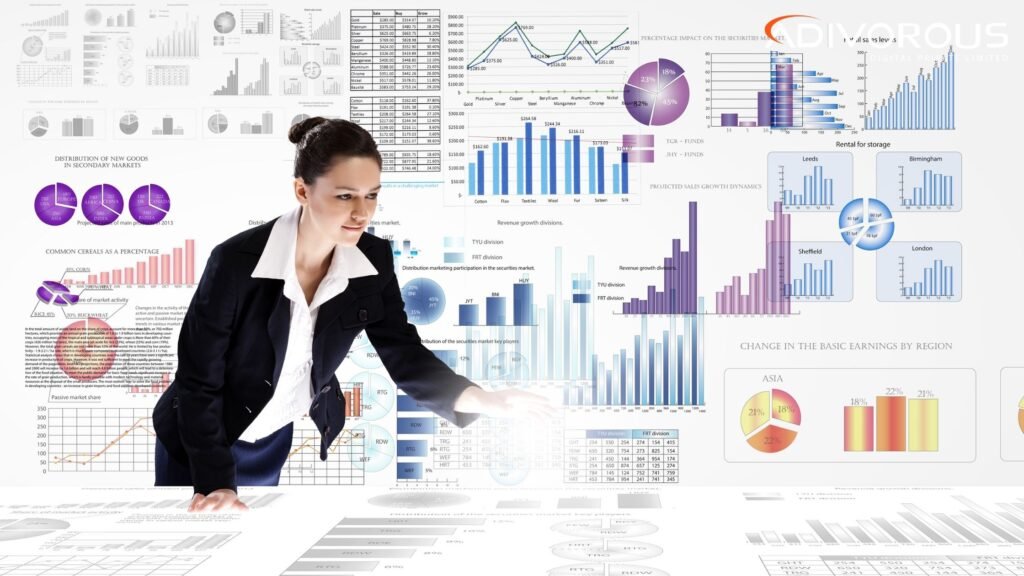Data analytics has emerged as a cornerstone for success in the ever-evolving digital marketing landscape. Collecting, analysing, and interpreting data allows digital marketing agencies to make informed decisions. As well as, optimize their strategies, and achieve better results. Here, Adivorous will delve into the significance of data analytics in digital marketing and how it can transform your business.
Understanding Data Analytics
Data analytics involves examining raw data to draw meaningful insights and conclusions. In digital marketing, this process includes tracking user behaviour, measuring campaign performance, and identifying trends. By leveraging various tools and techniques, marketers can gain a deeper understanding of their audience and tailor their strategies accordingly.
In the early days of the Internet, data analysis in digital marketing gained significant popularity in the late 1990s and early 2000s with the rise of increasing availability of data. The development of tools like Google Analytics further fueled this, allowing a digital marketing company to track website traffic and user behaviour in unprecedented detail. As digital marketing like social media and email marketing became more prominent, the importance of data analysis continued to grow. Marketers realized that by analyzing data, they could gain valuable into customer behaviour, they can optimize and improve their overall return investment.
Role of Data Analysis in Enhancing Customer Insights
One of the primary benefits of data analytics is the ability to gain comprehensive insights into customer behaviour. By analyzing data from various sources such as website visits, social media interactions, and email campaigns. For example, Adivorous can create detailed customer profiles for better serving ads. These profiles help in understanding customer preferences, pain points, and purchasing patterns, enabling marketers to deliver personalized experiences.
| Aspect | Description |
|---|---|
| Customer Profiles | Creating detailed profiles by analyzing data from various sources. |
| Behavior Tracking | Monitoring user behaviour on websites, social media, and email interactions. |
| Preference Identification | Understanding customer preferences and tailoring marketing strategies. |
| Pain Point Analysis | Identifying and addressing customer pain points. |
| Purchasing Patterns | Analyzing purchasing behaviour to predict future actions. |
| Personalized Experiences | Delivering personalized content and offers based on customer data. |
| Segmentation | Segmenting customers into groups for targeted marketing. |
| Feedback Analysis | Analyzing customer feedback to improve products and services. |
| Trend Identification | Spotting trends in customer behaviour and market demands. |
| Customer Journey Mapping | Mapping the customer journey to enhance the overall experience. |
Optimizing Marketing Campaigns for Better Customer Experience
Data analytics plays a crucial role in optimizing marketing campaigns. By tracking key performance indicators (KPIs) such as click-through rates, conversion rates, and return on investment (ROI), marketers like us can assess the effectiveness of our campaigns. This information allows us to make data-driven adjustments, such as reallocating budgets, refining targeting strategies, and improving ad creatives, to maximize results.
A positive customer experience is vital for brand loyalty and retention. Data analytics enables us to understand and enhance the customer journey. By analyzing touchpoints and interactions, we can identify areas of improvement and implement changes to provide a seamless experience. This could involve optimizing website navigation, personalizing content, or improving customer support.

Predictive Data Analytics for Future Planning and Competitive Advantage
Predictive analytics uses historical data to forecast future trends and behaviours. In digital marketing, this can be a game-changer. By predicting customer behaviour, market trends, and campaign outcomes, digital marketing companies can proactively adjust their strategies. For instance, predictive analytics can help identify the best times to launch a campaign, the most effective channels to use, and the potential ROI.
Having a tool with foresight like data analytics provides us with valuable insights into our client’s competitors’ strategies and performance. By analyzing competitor data, we can identify gaps in the market, uncover new opportunities, and refine our strategies to gain a competitive edge. After all, in a competitive market, staying ahead of the competition is crucial.
Measuring ROI and Performance for Real-Time Decision Making
One of the biggest challenges in digital marketing is measuring the ROI of various activities. Data analytics provides a clear picture of how different strategies and campaigns are performing. By tracking metrics such as cost per acquisition (CPA), customer lifetime value (CLV), and overall revenue, we can determine the effectiveness of our marketing efforts and make informed decisions about future investments.
Furthermore, the digital landscape is dynamic, with trends and consumer behaviours changing rapidly. Data analytics allows us to make real-time decisions based on current data. This agility is essential for responding to market changes, optimizing ongoing campaigns, and seizing new opportunities as they arise.
Conclusion
In conclusion, data analytics is an indispensable tool in digital marketing. It empowers Adivorous to make informed decisions, optimize our strategies, and achieve better results. By leveraging data analytics, we can gain deeper insights into customer behaviour, enhance the customer experience, and stay ahead of the competition. As the digital landscape continues to evolve, the importance of data analytics in digital marketing will only grow, making it a critical component for success in the modern business world.
FAQs
- What is data analytics in digital marketing?
- Data analytics in digital marketing involves examining raw data to draw meaningful insights and conclusions. This process includes tracking user behaviour, measuring campaign performance, and identifying trends to optimize marketing strategies.
- How does data analytics enhance customer insights?
- Data analytics enhances customer insights by creating detailed customer profiles, tracking user behaviour, identifying preferences and pain points, and analyzing purchasing patterns. This allows marketers to deliver personalized experiences and improve customer satisfaction.
- What role does predictive analytics play in digital marketing?
- Predictive analytics uses historical data to forecast future trends and behaviours. Digital marketing, helps digital a marketing company predict customer behaviour, market trends, and campaign outcomes, allowing them to proactively adjust their strategies for better results.
- How can data analytics optimize marketing campaigns?
- Data analytics optimizes marketing campaigns by tracking key performance indicators (KPIs) such as click-through rates, conversion rates, and return on investment (ROI). This information allows marketers to make data-driven adjustments to improve campaign effectiveness.
- Why is measuring ROI important in digital marketing?
- Measuring ROI is important in digital marketing because it provides a clear picture of how different strategies and campaigns are performing. By tracking metrics such as cost per acquisition (CPA) and customer lifetime value (CLV), businesses can determine the effectiveness of their marketing efforts and make informed decisions about future investments.






